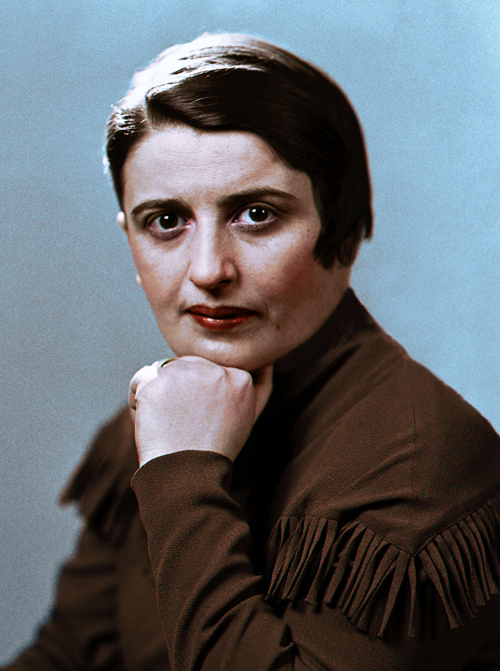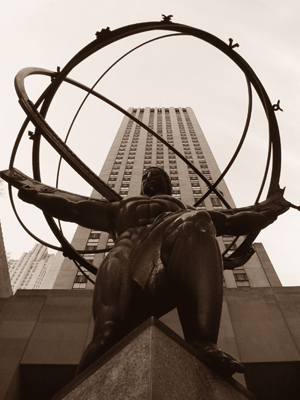
Your complimentary articles
You’ve read one of your four complimentary articles for this month.
You can read four articles free per month. To have complete access to the thousands of philosophy articles on this site, please
Classics
Atlas Shrugged by Ayn Rand
Shashwat Mishra introduces Ayn Rand’s massive novel promoting self-interest and laissez-faire capitalism.
Atlas Shrugged, published in 1957, is a novel by Russian-American philosopher Ayn Rand. It’s considered one of the most influential novels of the twentieth century and has had a significant impact on libertarian movements. It’s a massive tome, clocking in at over a thousand pages in most editions. However, its length is justified by the sheer amount of ideas and philosophical concepts it contains. Rand explores themes of individualism, capitalism, personal ambition, and the role of government. The novel tells the story of a dystopian society whose brightest and most productive members go on strike, leaving the rest of the world to crumble.
Here I want to briefly examine the relevance of the themes of Atlas Shrugged to our own culture.

Ayn Rand (1905-1982)
Ayn Rand coloured in by Julius Jääskeläinen Creative Commons 2.0
Plot
Atlas Shrugged is set in a world similar to our own, but where the brightest and most productive members of society have gone on strike. The main character, Dagny Taggart, is the Vice President of Operations at Taggart Transcontinental, a large railroad company. She’s determined to keep the company afloat despite the constant interference of the government and the ineptitude of her brother, James Taggart, who is the President of the company.
As the novel progresses, Dagny becomes involved with the mysterious John Galt, the strike leader. Galt has convinced the most productive people to withdraw from normal society and create their own in a hidden valley. These individuals are responsible for scientific and technological advances in the world, so their absence is causing the world to slowly fall apart.
Dagny eventually discovers the valley and meets with Galt and the other strikers. They explain their (that is, Rand’s) philosophy of Objectivism, which promotes individualism and laissez-faire capitalism. Dagny is convinced by their arguments and joins the strike, leaving the rest of the world to collapse.
Themes
One of the most significant themes in Atlas Shrugged is individualism. Rand’s ‘Objectivist’ philosophy argues that individuals are the most important unit of society and that individuals should be free to pursue their own goals without interference from others. Rand argues that society should not try to force individuals to conform to its expectations, but rather should allow them to pursue their own interests, since she believes that this is the key to a prosperous society. In Atlas Shrugged, the characters who embody this philosophy are the strikers who have withdrawn from the world to create their own. This philosophy is embodied in the character of John Galt, who represents the ideal of the independent, self-reliant individual.
Another significant theme in Atlas Shrugged is capitalism. Rand argues that capitalism is the most moral economic system because it allows individuals to pursue their own interests, which includes creating value for others. She believes that capitalism is the only economic system that allows for true innovation and progress. In the world of Atlas Shrugged, government and other institutions are portrayed as stifling innovation and progress. The government interferes with business, imposes regulations, and heavily taxes the most productive people. As a result, the most productive people go on strike, leaving the rest of the world to fend (badly) for itself.

Photo of Atlas statue New York Kurt Christensen 2006 Creative Commons 2
Atlas Shrugged is also a manifesto for Rand’s Objectivism, which emphasizes reason as well as individualism and capitalism. Rand believed that individuals should be guided by reason, not emotion, and that the pursuit of one’s own happiness is the ultimate goal of life (this position is sometimes called ethical egoism). Objectivism rejects the idea that individuals should sacrifice their own happiness for the sake of others or for society as a whole. Rather, Rand believed that individuals should only help others if it’s in their own self-interest to do so.
John Galt embodies the principles of Objectivism by being a rational, independent man who is committed to his own happiness and the pursuit of his own goals. Like Rand, he rejects the idea that individuals should sacrifice themselves for others, and, moreover, argues that altruism is a destructive, immoral philosophy.
Another significant theme in Atlas Shrugged is the role of government. Rand believed that government should have a very limited role: it should only be responsible for protecting individual rights. She argued that the government should not interfere with the economy or impose regulations on businesses.
In Atlas Shrugged the government is portrayed as a corrupt and oppressive institution which imposes regulations, over-taxes the most productive, and uses its power to control peoples’ lives. Rand uses Atlas Shrugged to argue that this kind of intervention stifles innovation, and leads to the decline of society.
Criticisms
Although Atlas Shrugged has been embraced by many, it has also been widely criticized. One of the main criticisms of the novel is over its politics. Rand’s Objectivism and her embrace of extreme laissez-faire capitalism have been widely criticized by economists, and some philosophers argue that her philosophy is simplistic and unrealistic. Many readers have also criticized the novel’s depiction of female characters, who are often portrayed as subservient to men. Some have even argued that although Ayn Rand was a woman her individualist philosophy is inherently sexist, as it does not take into account the ways in which women are oppressed by established social and economic structures. The novel has also been criticized for its treatment of minorities. Although Rand herself argued that her philosophy was egalitarian, some readers have pointed out that the novel is dominated by white males, and that characters who belong to minority groups are often stereotyped and marginalized.
Despite its controversial nature, Atlas Shrugged has had a significant impact, especially on American politics. The novel has been embraced by libertarians and conservatives who support Rand’s individualism and laissez-faire. Politicians such as Ron Paul and Paul Ryan have cited Rand as a major influence on their beliefs, and the novel has been credited with inspiring the Tea Party movement. Atlas Shrugged has also had a significant impact on popular culture, having been adapted into films, plays, and even a video game.
Conclusions
Atlas Shrugged is worth engaging with. The novel raises important questions about the roles of the individual, the government, and the economy in society, and forces readers to consider their own values and beliefs. Its complex characters and intricate plot offer a nuanced exploration of the human experience, and its philosophical ideas have inspired generations of readers.
Whether one agrees or disagrees with Rand’s Objectivism, there is no denying the impact that Atlas Shrugged has had on politics and culture. The novel’s enduring popularity demonstrates the power of fiction to shape our understanding of the world and to challenge our most deeply-held beliefs. As such, Atlas Shrugged deserves to be read, debated, and engaged with for generations to come.
© Shashwat Mishra 2024
Shashwat Mishra enjoys exploring how philosophy and economics influence our behaviour and shape how we interact with one another. When not exploring either of them, he plays a lot of quizzes, listens to Classic Rock and watches soccer, F1 and basketball.









